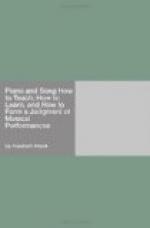EMMA. I know it. I am teaching it to my little sister, Cecilia.
DOMINIE. Will you allow her now to play Chopin’s two nocturnes, Opus 48?
* * * * *
I will say nothing about the conclusion of the singing,—the “Grace” aria. At midnight there was a grand supper, washed down with sweet wine, and seasoned with bitter recollections of this musical evening.
CHAPTER XV.
CONCLUSION.
I have received the following communication from an old literary friend, to whom I sent my eighth chapter, requesting his opinion of it:—
MOTTO.
There are unreceptive
times, but
that which is eternal
outlives all
times.—JOH.
VON MUeLLER.
MY DEAR FRIEND,—I have read your eighth chapter. What you facetiously call “the three trifles” seem to me to be three most important points, even if you had described them simply as fine taste, deep feeling, and a good ear. Who expects superlative excellence from the age in which he lives, and who dares to attack it, in its most vulnerable parts? You grow more harsh and disagreeable, and you do not seem to consider how many enemies you make, among those who think that they have long ago advanced beyond these three points. Just now, too, when there is so much said about “the intellectual” in music, and about “the inner nature of the future,” and when such fine expressions are invented about it, you come forward with your three unseasonable trifles in the superlative degree. Do you imagine that our intelligent age cannot discern your hidden satire?
You say that our times are in need of your three trifles, and the necessary knowledge and experience. Voila tout!
As for Prince Louis Ferdinand, Dussek, Clementi, Himmel, Hummel, C.M.v. Weber, Beethoven, &c.,—who has not heard all about them?
After them, comes the period of “piano fury,” and the compositions appropriate for it. Now the three trifles required are distorted taste, hypocritical feeling, and a depraved ear, combined with the necessary superficiality and some power of production. Voila tout!
After that, musicians bethink themselves once more of the genuine three trifles, and return to reason, and we are allowed to take delight in Chopin, Mendelssohn, Fr. Schubert, Robert Schumann, and a few others of the same sort, and again in Beethoven.
These were succeeded by mere dry imitators; they were not, however, of much significance.
Finally, the very latest progress introduces a still more extravagant piano fury. The three trifles are now distorted taste, no feeling, and no ear for tone; and with these are required the necessary audacity, immeasurable vanity, senseless exhibitions of strength, a poor touch upon the piano, and what they call “intellect.” The compositions are now embellished with appropriate pictures on the cover, and with attractive title-pages. In addition, there is much talk about a “higher beauty,” “the stand-points which have been already surmounted,” “artistic flights,” and the “misunderstanding of the inner consciousness,” “Genius must be free,” &c.




